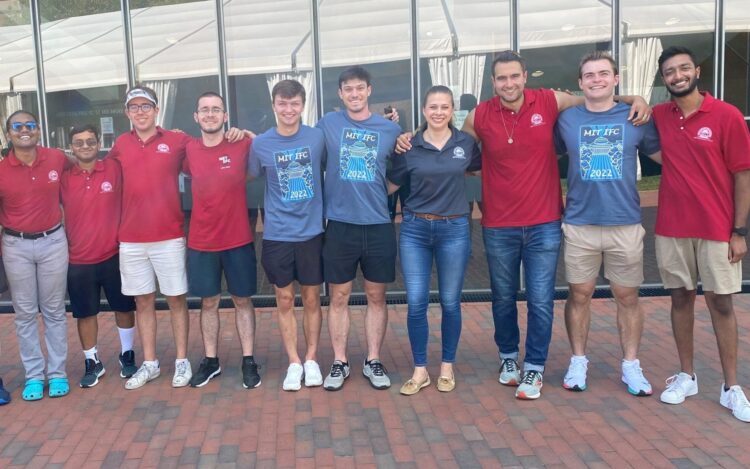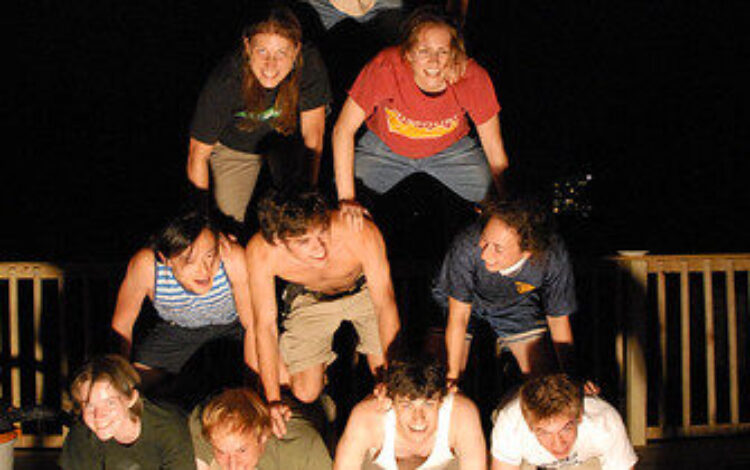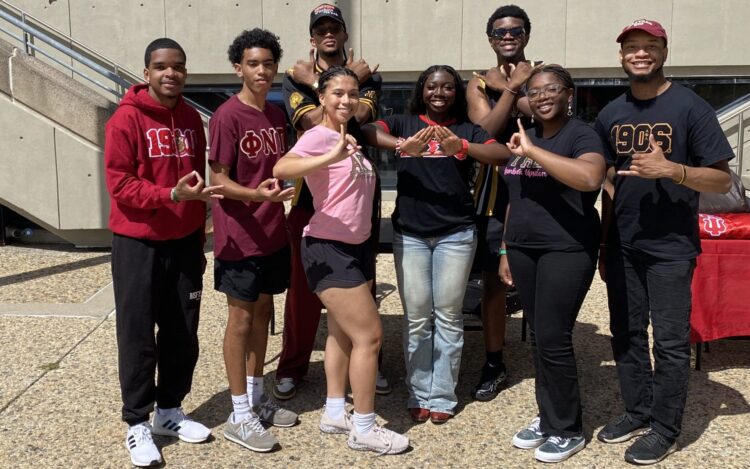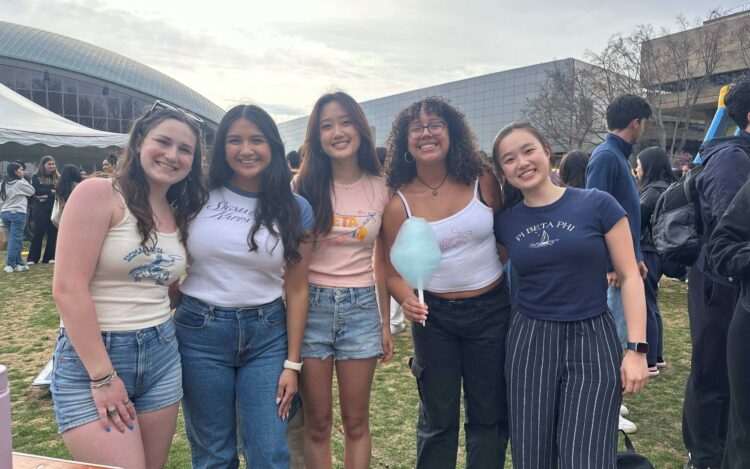Fraternities, Sororities, and Independent Living Groups
We provide support and resources to the self-governed MIT Fraternity, Sorority, and Independent Living Group (FSILG) community. These values-based social organizations provide members with a community of peers and a unique experience in leadership, community planning, personal growth, and group interactions.
MIT’s FSILG community was established in 1882 to provide an integrated social and living environment. Approximately 37 percent of the undergraduate student body (1,700+ students) belongs to one of the 43 recognized FSILGs.
Our Mission
We support, advise, and advocate for all FSILG organizations and their student members in a shared-governance system. The FSILG Office is a primary resource to develop leaders and coordinates opportunities for members in a diverse and enriching learning environment.
We collaborate with dedicated alumni/ae and campus partners to ensure that the FSILG community is achieving its goals and students and organizations are reaching their highest potential. We foster a community of care to support student growth and learning both inside and outside the classroom.
Our Community
FSILGs have a rich and vibrant past and present at MIT. Currently, MIT is home to 43 FSILGs, 36 of which are housed across Boston, Brookline, and Cambridge. Each FSILG belongs to one of four governing councils:
Interfraternity Council
The IFC represents 24 fraternities. This includes 5 gender-inclusive organizations and 19 men’s only organizations.

Living Group Council
The LGC represents five independent living groups. These groups operate as cooperatives housing 20–40 MIT students. Four are gender inclusive, and one is a women-only living community.

Multicultural Greek Council
The MGC represents seven culturally based fraternities and sororities. Three historically Black fraternities, two historically Black sororities and one historically Latina sorority.

Panhellenic Council
Panhel represents six sororities. Panhellenic is the largest women’s organization on campus with more than 500 members.

- Alpha Delta Phi Society – IFC
- Alpha Phi Alpha Fraternity, Inc – MGC
- Beta Theta Pi – IFC
- Chi Phi – IFC
- Delta Kappa Epsilon – IFC
- Delta Psi – IFC
- Delta Tau Delta – IFC
- Kappa Alpha Psi Fraternity, Inc – MGC
- Kappa Sigma – IFC
- Lambda Chi Alpha – IFC
- Lambda Upsilon Lambda Fraternity, Inc – MGC
- Nu Delta – IFC
- Phi Beta Epsilon – IFC
- Phi Beta Sigma Fraternity, Inc – MGC
- Phi Delta Theta – IFC
- Phi Kappa Psi – IFC
- Phi Kappa Sigma – IFC
- Phi Kappa Theta – IFC
- Phi Sigma Kappa – IFC
- Pi Lambda Phi – IFC
- Sigma Alpha Epsilon – IFC
- Sigma Chi – IFC
- Sigma Nu – IFC
- Theta Chi – IFC
- Theta Delta Chi – IFC
- Theta Xi – IFC
- Xi Fellowship – IFC
- Zeta Beta Tau – IFC
- Zeta Psi – IFC
- Alpha Chi Omega – Panhel
- Alpha Kappa Alpha Sorority, Inc – MGC
- Alpha Phi – Panhel
- Delta Phi Epsilon – Panhel
- Delta Sigma Theta Sorority, Inc – MGC
- Kappa Alpha Theta – Panhel
- Omega Phi Beta Sorority, Inc – MGC
- Pi Beta Phi – Panhel
- Sigma Kappa – Panhel
- Epsilon Theta – LGC
- Fenway House – LGC
- pika – LGC
- Student House – LGC
- Women’s Independent Living Group – LGC
- Alpha Epsilon Phi – Sorority
- Alpha Epsilon Pi – Fraternity
- Alpha Sigma Phi – Fraternity
- Alpha Tau Omega – Fraternity
- Delta Upsilon – Fraternity
- Phi Gamma Delta (Fiji) – Fraternity
- Phi Mu Delta – Fraternity
- Phi Sigma Rho – Sorority
- Pi Kappa Alpha – Fraternity
- Sigma Alpha Mu – Fraternity
- Sigma Phi Epsilon – Fraternity
- Tau Epsilon Phi (tEp) – Fraternity
- Theta Tau – Fraternity
Policies and Procedures
FSILGs have a long-standing, positive history at MIT. In addition to developing life-long connections and support, involvement in a FSILG can deepen students’ educational experiences by offering members opportunities for civic engagement, service, team work, and leadership development.
The Institute relies on the support and collaboration of our students, alumni/ae, and when applicable, the volunteers and staff members from international/national fraternities and sororities. We apply a shared-governance model designed to maintain and encourage a healthy and dynamic FSILG community. The FSILG Cooperative provides support for facilities and purchasing for residences.
Additional Resources for Students & Alumni
Association of Independent Living Groups (AILG) – The AILG is the federated group of Alumni Corporations and Advisory Boards involved with MIT’s FSILGs. The AILG is led by alum volunteers, with staff and financial support provided by the FSILG Office and the MIT Division of Student Life. More than 40 alums volunteer annually in various roles – on the Board of Directors and on different committees.
Independent Residence Development Fund (IRDF) – The IRDF Project Grant program reimburses FSILGs for improvements to the house in the areas of educational, safety, and accessibility.
FSILG Cooperative, Inc (FCI) – The FCI is a cooperative purchasing company for MIT FSILGs.
Meet Our Staff
The FSILG Office fosters a cohesive community that values civic responsibility, mutual respect, and the growth of organizations and their members. Our staff is committed to excellence and advancing the future of the FSILG community.
Liz Jason
I Can Help With General FSILG topics; FSILG Alumni; FSILG Policy; FSILG Extension; FSILG Facilities; FSILG GRA program

Anthony Dominguez
I Can Help With IFC fraternities & history; IFC recruitment, retention, risk management, event planning; IFC GRAs, Sexual Health Education, IFC Processes

Nolan Rehrig
I Can Help With IFC fraternities

Isabel Feliciano
I Can Help With Independent Living Groups and the Weedon ’41 Alumni Relations Award Program

Contact the Team
Monday – Friday: 9:00AM – 5:00PM